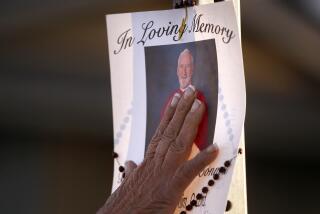POINT / COUNTERPOINT : Lutheran Turns Catholic: Growth or Betrayal? : One Shouldn’t Renounce the Reformation
- Share via
My friend and fellow Lutheran pastor has become a Roman Catholic. Though Richard John Neuhaus and I have often disagreed over the last 22 years, this time the disagreement runs deep and leaves me feeling a bit betrayed.
How can a Lutheran--an heir to the 16th-Century Protestant Reformation--set aside this heritage and seek to be “re-ordained” a Catholic priest?
Richard has campaigned vigorously for the special contribution that the Lutheran part of the Church can make to world Christendom. Will he, like Martin Luther, be asked to recant those writings in order to proclaim allegiance to the Pope and Roman Catholic hierarchy?
Not that the Roman Catholic Church isn’t Christian. My friend hasn’t “converted” and remains a brother in Christ. The ecumenical movement has taught us that the faith transcends denominational boundaries.
But the Protestant Reformation, in seeking an unfettered Gospel, opposed that which would constrict freedom of conscience or punish theological inquiry. It resisted binding the Word of God to a particular institutional interpretation. The Reformation opposed setting any aspect of Christian dogma above the central message: That because Jesus Christ died and rose again, a fallen, sinful humanity is reconciled to God.
My friend’s decision is, of course, a personal one; and on that level I give it my full blessing. In that Richard believes God is calling him to be a Roman Catholic, he should answer the call. But the ministries given to us as Christians are not given in a vacuum. Richard received his call to ministry and training for the priesthood as a Lutheran and for his whole life has exercised his pastorate as a Lutheran.
Furthermore, by speaking and writing prolifically, eloquently and effectively on “our side” for many years, Richard sought and won a specific role within Lutheran circles. He was an interpreter and a defender of Reformation principles. His writings have already suggested that the time has come to heal the Lutheran-Catholic schism of the Reformation. This may be true, but to do this by simply joining an as yet unreformed Catholicism seems arrogant. He will now say, no doubt with equal eloquence, that his place was always within the “whole” Church and that Catholicism is more “whole” than the rest of us.
This is the part I do not understand.
Though he leaves the Evangelical Lutheran Church in America, Richard spent most of his ministry within the staunchly conservative Lutheran Church-Missouri Synod. When this denomination was wracked with strife in the 1970s over leadership that imposed authoritarian rules, suppressed dissent and cruelly persecuted bishops, pastors and lay leaders who disagreed with some church policies, Richard joined the opposition.
Why, I ask, is he now joining an organization that imposes authoritarian rules, suppresses dissent and persecutes bishops, pastors and lay leaders who disagree?
Many Lutherans feel strongly that the reform movement begun by Martin Luther in the 16th Century was and is still intended to be a movement for change within the whole Church. We work and pray for the time when barriers that divide Christians might be lowered. Richard has been a strong voice within this movement; and his action now states that he no longer holds out any hope for the sons and daughters of the Protestant Reformation.
So this is not an ecumenical gesture, a simple moving to a pew on the other side of the aisle. In accepting today’s Roman Catholicism, Richard turns his back on the heritage in which he learned the faith and preached the Gospel. In accepting “re-ordination” as a Catholic priest, he calls into question the ministry of all who hope that a future Church can reconcile our diversities in faith and practice.
Though his has been an influential voice, it is highly unlikely that other Lutherans will follow Richard to Roman Catholicism. Some, it must be admitted, will be glad to be rid of a persistent gadfly in our circles. Those who oppose ecumenism will be re-confirmed in their conviction that it is subversive and betrays Protestantism.
No one involved in any ecumenical endeavor believes that full Lutheran-Catholic reconciliation will be easy or that it will come soon. But we cringe when people speak or act as if it can never happen.
More to Read
Sign up for Essential California
The most important California stories and recommendations in your inbox every morning.
You may occasionally receive promotional content from the Los Angeles Times.













